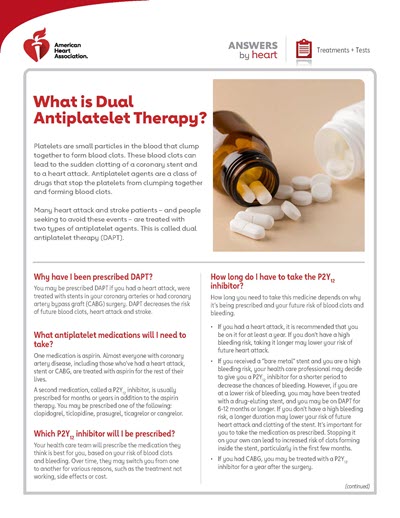Understanding Your Options When Taking Aspirin and Other Antiplatelet Drugs
Many heart attack and stroke patients – and people seeking to avoid those events – are treated with what’s known as dual antiplatelet therapy. Simply put, that means taking aspirin along with a second drug to prevent blood clotting.
Dual antiplatelet therapy, referred to as DAPT, often is prescribed for patients who have had heart attacks, are treated with stents in their coronary arteries, and some patients who undergo coronary artery bypass surgery.
Aspirin is an antiplatelet agent that probably will be prescribed for the rest of a patient’s life, if the patient falls into one of these categories and doesn’t have strong reasons not to take it. A second type of antiplatelet agent, technically called a P2Y12 inhibitor, is usually prescribed for months or years in addition to aspirin.
There are three P2Y12 inhibitors that doctors prescribe: clopidogrel, prasugrel and ticagrelor. Which one you take and how long you take it depends on your personal risks for heart attack, stroke or other cardiovascular events and other factors that you’ll discuss with your doctor.
“Truly the most important aspect of all medication decisions is to have honest, frank and continuous discussion with your physician to fully understand the risks and benefits,” said Mark Creager, M.D., the American Heart Association’s immediate past president and director of the Heart and Vascular Center at Dartmouth-Hitchcock Medical Center. “The best decision for every patient is made in partnership with his or her healthcare provider.”
Key differences between antiplatelet drugs
Studies have shown that of the three medications, ticagrelor and prasugrel reduce events caused by clotting (like heart attack and ischemic stroke) more than clopidogrel in some patients. This is especially true for those who have specific genetic differences in terms of how their bodies handle clopidogrel. However, these drugs also have been found to cause more bleeding at usual doses. A risk of bruising and bleeding is seen with all anti-platelet drugs.
Prasugrel should not be used by patients who have had a stroke or a transient ischemic attack (often called a warning stroke). That’s because these patients experience more strokes (both those caused by clots and those caused by bleeding in the brain) when treated with prasugrel than with clopidogrel.
According to the Food and Drug Administration, clopidogrel decreases the risk of stroke and heart attack, but does not reduce the risk of death for specific patients.
The costs of each medication differ as well, which is another factor to discuss with your healthcare provider.
Some DAPT patient examples
Here is a look at how long DAPT may last for some patients:
If you did not have a heart attack, but have atherosclerosis in your coronary arteries and have had a stent placed, in addition to aspirin, you should be on clopidogrel for at least one to six months. This depends on the type of stent that was placed, risk of clotting the stent and bleeding risk.
If you had a heart attack and a coronary artery stent placed, or you are being treated with medical therapy (no stent, clot buster or surgery), in addition to aspirin, you should be treated with DAPT for 6-12 months, even longer in some cases.
Some patients who undergo coronary artery bypass surgery may be treated with a P2Y12 inhibitor for a year after the bypass operation. After this, the P2Y12 inhibitor may be stopped, but the patient continues on aspirin. Your surgeon will discuss with you whether this treatment will be needed.
Overall, the duration of any DAPT treatment varies. Duration is very specifically made for the patient in conjunction with the doctor based on a number of factors, including the risk for bleeding, future heart attacks, strokes, clotting of the stent and death.
Drug interactions to be aware of
DAPT patients also have to be mindful of the many interactions that can occur when taking multiple medications. Some over-the-counter medications can even create problems.
For example, over-the-counter drugs for acid-suppression and heartburn can reduce the benefits of clopidogrel.
Ibuprofen and other non-steroidal inflammatory drugs can lead to problems with all three P2Y12 inhibitors.
“They can increase the risk of bleeding,” said John Osborne, M.D., Ph.D., a cardiologist, researcher and founder of State of the Heart Cardiology in Dallas.
Of course, many other drugs – and even some foods – can interact negatively with medications.
For example, grapefruit can affect the way some cholesterol medications work. And some *blood thinners and anticoagulants such as warfarin can react to over-the-counter drugs like ibuprofen.

“Over- the- counter medications may seem benign, but there is a potential for harm,” Creager said. “These drugs may interfere with the desired action of a prescription medication or increase the likelihood of a serious side effect.”
But, as always, the key advice is to keep talking to your healthcare provider.
“In the broadest sense, always ask your doctor,” Osborne said. “That’s very, very important.”
Learn more:
- Downloadable patient sheet: What is DAPT? (PDF)
- Read about the DAPT guidelines







